
Studio produces ideas on harnessing talent of changing workforce
Photo credit: Tom Clark.
Overview: Knight Foundation hosted 100 civic innovators at a Civic Innovation in Action Studio in Miami May 12 -14 to explore ways to harness talent, advance opportunity and promote robust engagement.
The changing face of the workforce opens new opportunities for cities. As self-employment continues to grow and traditional career norms falter there is a chance to lay a new foundation for talent to thrive. But cities need to act. That means creating a new climate for civic innovation, rooted in collaborative idea sharing and discovery. RELATED LINKS
“Putting ideas into action to build better cities” by Carol Coletta on KnightBlog
“Learning Lab gathers ideas on promoting community engagement” by Carol Coletta on KnightBlog
“Learning Lab gathers ideas on making the most of talent in our cities” by Carol Coletta on KnightBlog
“Innovators develop ideas on advancing opportunity” by Michael Bolden on KnightBlog.org
“Boston adopts new tools to engage residents in civic life” by Nigel Jacobs on KnightBlog
“Scaling an Etsy Economy for a changing workforce” by Dana Mauriello on KnightBlog
“Harriet Tregoning, identifying ideas to expand opportunities in cities” by Carol Coletta KnightBlog
“Encouraging more robuts acts of citizenship” by Adam Royalty and Scott Witthoft on KnightBlog
“Studio explores ideas for successful cities” by Carol Coletta on KnightBlog
“Civic innovators gather in Miami to build ideas for successful cities” by Michael Bolden on KnightBlog
“Innovators embrace broad themes of robust engagement” by Andrew Sherry on KnightBlog
“Studio developing ideas on harnessing talent of a changing workforce” by Anusha Alikhan on KnightBlog
“Studio produces trove of ideas to improve civic engagement” by Andrew Sherry on KnightBlog
“Civic Innovation in Action Studio tees up top ideas for better communities” by Michael Bolden on KnightBlog
The first day of Knight Foundation’s Civic Innovation in Action Studio on Harnessing Talent centered on team building, encouraging more than 30 participants to work in six groups to ideate and share the results. This laid the groundwork for the second day, allowing groups to develop more concrete prototypes to address a central challenge facing cities today: What are the programs, platforms and policies needed to harness talent and expand opportunity in an economy with a workforce that is increasingly fluid and independent?
Justin Ferrell, Stanford d.school fellowship director and a facilitator of the Harnessing Talent design session, kicked off the day, emphasizing that the best way to prototype is to test and learn.
“Today is about launching to learn, not coming up with an idea that is fully cooked,” he said. “It’s a chance to add more context and depth to your ideas.”
David Janka, another facilitator from the d.school, then instructed groups to build out one or two of their top ideas from yesterday with a storyboard and begin testing. Each group member was asked to take on a role as part of the testing process: The host set the scene, actors played out the story, and observers took notes on what to improve.
Groups launched into a lively mixture of role-playing and discussion, improving their ideas and joining other teams for feedback. One team built a toolkit for public libraries to engage them in supporting independent workers. The toolkit included ways for libraries to function similar to maker spaces, allowing workers to access equipment (high-speed broadband, scanners, 3-D printers, sewing machines), get help (IT, loan officer, manufacturing expert, librarian), and design their space (shared tables, couch, kitchen). It also positioned the library as an important civic institution, a place where independent employees can meet and work.
A second group designed a way to get independent contractors to share best practices, which is usually difficult due to competition among contractors. The idea was to mount citywide cash-prize challenges that would unite contractors to submit proposals for a particular project, such as building a new public library. Rather than building out the project, however, the main intent of the challenge would be to connect contractors and collect best practices. In this way, the challenge would serve as a vehicle for developing more trust and collaboration between contractors, while creating new learning tools.
The day ended with individual groups presenting a refined version of their prototype to everyone. In addition to the above ideas, four prototypes that surfaced included:
· Creating a digital platform that would combine some of the functionalities of Craigslist, Angie’s List and eBay. The localized site would match a service need with a skilled worker and allow consumers to specify the maximum amount they would pay for a particular service.
· Establishing a “We Are Freelance Friendly” (WAFF) score that would create a rating system for freelance-friendly neighborhoods, cities and organizations. It would use an open-data model to allow freelancers to choose places to live and work based on availability of resources, support networks and potential to grow. It would also reveal the geography of how freelancers cluster by industry.
· Developing an “economic observatory” tailored to the independent worker or project economy that would aggregate and translate relevant data (from tools such as TrendWatch and SpringWise) and help cities identify opportunities. Users would be able to filter information by industry, size and location to get personalized results.
· Organizing a “networking train car” that would reserve one section as a designated networking space that would include a friendly host, standing tables and name tags for everyone.
Each of the ideas captured the main goal of two days of design: to bring new ideas to our communities and lay the groundwork for creating a network of civic innovators.
Anusha Alikhan is communications director at Knight Foundation.
Recent Content
-
Community Impactarticle ·
-
Community Impactarticle ·
-
Community Impactarticle ·


